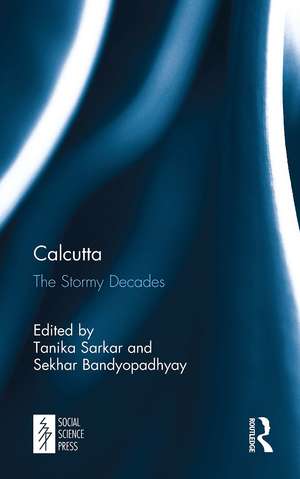Calcutta: The Stormy Decades
Editat de Tanika Sarkar, Sekhar Bandyopadhyayen Limba Engleză Paperback – 25 iun 2024
| Toate formatele și edițiile | Preț | Express |
|---|---|---|
| Paperback (1) | 264.18 lei 6-8 săpt. | |
| Taylor & Francis – 25 iun 2024 | 264.18 lei 6-8 săpt. | |
| Hardback (1) | 369.73 lei 6-8 săpt. | |
| Taylor & Francis – 21 iun 2017 | 369.73 lei 6-8 săpt. |
Preț: 264.18 lei
Preț vechi: 328.68 lei
-20% Nou
Puncte Express: 396
Preț estimativ în valută:
50.56€ • 52.48$ • 42.16£
50.56€ • 52.48$ • 42.16£
Carte tipărită la comandă
Livrare economică 22 martie-05 aprilie
Preluare comenzi: 021 569.72.76
Specificații
ISBN-13: 9781032652856
ISBN-10: 1032652853
Pagini: 486
Dimensiuni: 138 x 216 mm
Greutate: 0.66 kg
Ediția:1
Editura: Taylor & Francis
Colecția Routledge
Locul publicării:Oxford, United Kingdom
ISBN-10: 1032652853
Pagini: 486
Dimensiuni: 138 x 216 mm
Greutate: 0.66 kg
Ediția:1
Editura: Taylor & Francis
Colecția Routledge
Locul publicării:Oxford, United Kingdom
Public țintă
PostgraduateNotă biografică
Tanika Sarkar is retired professor of History at JNU, Delhi. Her most recent publication is Rebels, Wives and Saints: Designing Selves and Nations in Colonial Times, Permanent Black, Ranikhet, and Seagull, New York, 2009.
Sekhar Bandyopadhyay is a professor of Asian History at Victoria University, Wellington, New Zealand. His most recent publication is From Plassey to Partition and After: A History of Modern India, New Delhi: Orient BlackSwan, 2015.
Sekhar Bandyopadhyay is a professor of Asian History at Victoria University, Wellington, New Zealand. His most recent publication is From Plassey to Partition and After: A History of Modern India, New Delhi: Orient BlackSwan, 2015.
Cuprins
- 1. Introduction: Calcutta in History and Historiography - Sekhar Bandyopadhyay
Ordering the urban space
2. The Flute (1932) - Rabindranath Tagore (translated by Sumit Sarkar) 3. Calcutta on the Threshold of the 1940s - Partho Datta, Rajarshi Chunder
War, famine and unrest
5. The Elusive Chase: ‘War Rumour’ in Calcutta during the Second World War - Ishan Mukherjee 6. Japan Attacks - Janam Mukherjee 7. When Mill Sirens Rang out Danger: The Calcutta Jute Mill Belt in the Second World War - Anna Sailer 8. Protest and Politics: Story of Calcutta Tram Workers 1940-47 - Siddhartha Guha Ray 9. Emergence of Mahila Atma Raksha Samiti in the Forties—Gargi Chakravartty 10. Famine, Food and the Politics of Survival in Calcutta: 1943–50 - Sanjukta Ghosh
Communal relations: Solidarities and violence
11. On a Birthday (1946) -Samar Sen (translated by Sumit Sarkar) 12. A Different Calcutta: INA Trials and Hindu-Muslim Solidarity in 1945 and 1946- Sohini Majumdar 13. The Role of Colonial Administration, ‘Riot Systems’ and Local Networks during the Calcutta Disturbances of August 1946 - Nariaki Nakazato 14. A City Feeding on Itself: Riots, Testimonies and Literatures of the 1940s in Calcutta - Debjani Sengupta 15. Calcutta and its Struggle for Peace: Anti-Communal Resistance, 1946–47
Post Colonial Transition
16. Calcutta, a City in Transition: Expectations and Anxieties of Freedom, 1947–50 - Sekhar Bandyopadhyay 17. Visually Imagining the City: Urban Planning in 1950s Calcutta and Surjyatoran - Sukanya Mitra 18. Building Bijaygarh: A Microhistory of Refugee Squatting in Calcutta - Uditi Sen 19. Becoming a Minority Community: Calcutta’s Muslims after Partition - Anwesha Sengupta 20. I Had a Dream One Night (1929) Rabindranath Tagore (translated by Swagata Mazumdar) 21. Time in Place: Urban Culture in Decades of Crisis - Tanika Sarkar
Descriere
The period (1940s to 1950s), was chaotic and turbulent in Calcutta, yet, this was also a time of significant creativity in literature, art, films and music in the city. The originality of the work lies in blending poetry with historical writing, retaining the essence of both forms against the backdrop of the tumultuous events of the critical dec
